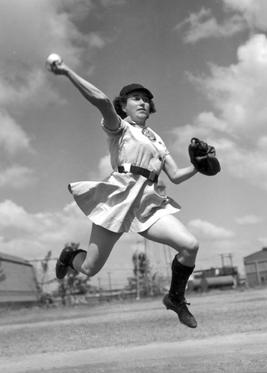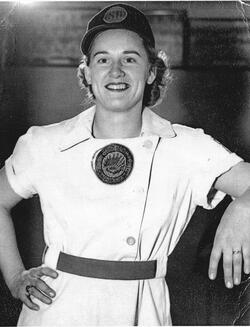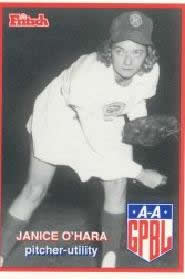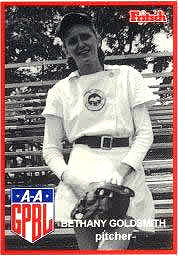Related Research Articles

In baseball, a perfect game is a game in which one or more pitchers complete a minimum of nine innings with no batter from the opposing team reaching base. To achieve a perfect game, a team must not allow any opposing player to reach base by any means: no hits, walks, hit batsmen, uncaught third strikes, catcher's interference, fielder's obstruction, or fielding errors which allow a batter to reach base.

In baseball, a no-hitter or no-hit game is a game in which a team does not record a hit through conventional methods. Major League Baseball (MLB) officially defines a no-hitter as a completed game in which a team that batted in at least nine complete innings recorded no hits. A pitcher who prevents the opposing team from achieving a hit is thereby said to have "thrown a no-hitter". In most cases, no-hitters are recorded by a single pitcher who throws a complete game; one thrown by two or more pitchers is a combined no-hitter.

The Kenosha Comets were a women's professional baseball team based in Kenosha, Wisconsin that played from 1943 through 1951 in the All-American Girls Professional Baseball League. The team played their home games at Kenosha's Lake Front Stadium, but later moved to Simmons Field.

Kathleen Lois "Flash" Florreich was a pitcher and utility player who played from 1943 through 1950 for three different teams of the All-American Girls Professional Baseball League. Listed at 5 ft 5 in (1.65 m), 140 lb., Florreich batted and threw right-handed. She was born in Webster Groves, Missouri.

Constance Wisniewski (Wiśniewski) was a starting pitcher and outfielder who played from 1944 through 1952 in the All-American Girls Professional Baseball League. Listed at 5' 8", 147 lb., she batted left-handed and threw right-handed.

Alma Ziegler was an infielder and pitcher who played from 1944 through 1954 in the All-American Girls Professional Baseball League. Listed at 5 ft 3 in (1.60 m), 125 lb., Ziegler batted and threw right-handed.

Jean Anna Faut [Winsch/Eastman] was an American starting pitcher who played from 1946 through 1953 in the All-American Girls Professional Baseball League. Listed at 5 ft 4 in (1.63 m), 137 lb., she batted and threw right-handed.

Anna May Hutchison ["Hutch"] was a female pitcher and catcher who played from 1944 through 1949 in the All-American Girls Professional Baseball League. Listed at 5 ft 7 in (1.70 m), 149 lb., she batted and threw right-handed. Sometimes she is credited as Anna Mae Hutchison.

Janice Winifred O'Hara [״Jenny״] was a pitcher and utility who played from 1943 through 1949 in the All-American Girls Professional Baseball League. Listed at 5 ft 6 in (1.68 m), 122 lb., she batted and threw right-handed.

The 1943 All-American Girls Professional Baseball League season marked the inaugural season of the circuit. Since the only organized ball for women in the country was softball, the league created a hybrid game that included both softball and baseball.
The 1944 All-American Girls Professional Baseball League season marked the second season of the circuit. The AAGPBL expanded in its second year of existence by adding two franchises to the original four-team format. At this point, the Milwaukee Chicks and the Minneapolis Millerettes joined the Kenosha Comets, Racine Belles, Rockford Peaches and South Bend Blue Sox. The number of games in the schedule also increased to 118, while the final Scholarship Series faced first-half winner Kenosha against Milwaukee, second-half champ, in a Best of Seven Series.
The 1946 All-American Girls Professional Baseball League season marked the fourth season of the circuit. The AAGPBL expansion brought two new franchises to the previous six-team format. At this point, the Muskegon Lassies and the Peoria Redwings joined the Fort Wayne Daisies, Grand Rapids Chicks, Kenosha Comets, Racine Belles, Rockford Peaches and South Bend Blue Sox. The eight teams competed through a 112-game schedule, while the final Shaugnessy playoffs faced season winner Racine against defending champion Rockford in a Best of Seven Series.
The 1947 All-American Girls Professional Baseball League season marked the fifth season of the circuit. The teams Fort Wayne Daisies, Grand Rapids Chicks, Kenosha Comets, Muskegon Lassies, Peoria Redwings, Racine Belles, Rockford Peaches and South Bend Blue Sox competed through a 112-game schedule. The final Shaugnessy playoffs faced second place Grand Rapids against third place Racine in a Best of Seven Series.
The 1948 All-American Girls Professional Baseball League season marked the sixth season of the circuit. The AAGPBL grew to an all-time peak of ten teams in that season, representing Eastern and Western zones, just in the first year the circuit shifted to strictly overhand pitching. Other modifications occurred during 1948. The ball was decreased in size from 11+1⁄2 inches (290 mm) to 10+3⁄8 inches (260 mm), while the base paths were lengthened to 72 feet and the pitching distance increased to 50 feet.
The 1950 All-American Girls Professional Baseball League season marked the eight season of the circuit. The teams Fort Wayne Daisies, Grand Rapids Chicks, Kenosha Comets, Muskegon Lassies, Peoria Redwings, Racine Belles, Rockford Peaches and South Bend Blue Sox competed through a 112-game schedule.

Sylvia Wronski [Straka] was a pitcher who played for parts of two seasons in the All-American Girls Professional Baseball League. Listed at 5 ft 2 in (1.57 m), 140 lb., she batted and threw right-handed.

Bethany Joan "Beth" Goldsmith was a pitcher who played from 1948 through 1950 in the All-American Girls Professional Baseball League. Listed at 5 ft 10 in (1.78 m), 160 lb, she batted and threw right-handed.
References
- 1 2 3 4 5 6 7 8 9 10 11 12 13 14 15 16 17 18 19 20 21 22 23 24 25 "AAGPBL no-hitters". NoNoHitters.com.
- ↑ "August 15, 1943: Canada's Olive Little tosses first no-hit, no-run game in AAGPBL history". Society for American Baseball Research.
- ↑ "July 29, 1944: Annabelle 'Lefty' Lee tosses AAGPBL's first perfect game for Minneapolis Millerettes". Society for American Baseball Research.
Book sources
- Madden, W. C. (2000). All-American Girls Professional Baseball League Record Book. McFarland & Company. ISBN 978-0-7864-3747-4.